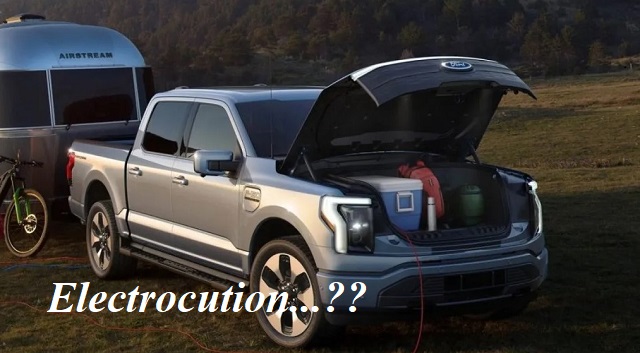Opinion/Editorial
ELECTROCUTION
The Ford Motor Company, one week ago. February 16, terminated the production of its highly funded, touted, and unworkable EF150 pickup truck. What happened? Was it terminated because of the reasons given by the company or was it because of the predictions I made on this site not long ago? The company said it was because they could not manufacture the batteries for the truck qualitatively enough to live up to the predictions they’d made for distance and endurance.
Well, that’s close. Actually, as I predicted, the company is right about one thing. The batteries. The lithium out there is primarily controlled by Elon Musk and Panasonic. Their control over the mining industry is not complete, however, but they do control the lithium mines that produce the purest product. What’s the difference between working with the less than pure stuff? It’s expensive to process and without huge expenditures of time and money it can’t measure to the metallic stuff Tesla is using and Elon and Panasonic own. The second problem they ran into is that Tesla vehicles, all of them, do not ever work under tough off-road or construction and towing conditions. The electric discharge of batteries is not linear, it depletes in a curve, that accelerates mightily under duress, unlike the expenditure of energy experienced by gasoline or diesel powerplants. In other words, the electric power in the vehicle batteries, which if rationed out at lower levels gives greater range than gas or diesel, deplete much faster than the supplies of gas and diesel fuel being expended for equal work under duress.
Finally, there’s the ‘good old boy’ thing. This third element is the one I took into an Illinois Ford dealership to discuss, as the owner there is a friend of mine. I explained, as best I could, the anthropology of the ‘normal’ F150 pickup driver. That driver wants sound, and lots of it, to attract attention. That driver likes the black diesel smoke and smell of heavy diesel engines. That driver wants to pull tree stumps with his ride, and he wants the world to know that he’s all man because only husky, healthy and powerful men own and drive such rigs. The owner strongly disagreed with that part of my presentation. He placed an order for thirty of the trucks and he said that he already had pre-orders for that many and that I was entirely wrong. He ‘sent back’ 27 trucks in late January to Ford, claiming that they were not yet performing as they should. He lied. He couldn’t sell them because none of the rural men out in the countryside would buy them. Elon Musk has held off on the production of his famed pickup because he’s a bright man and he’s figured out the same stuff that I’ve presented here. I would not expect that trucks, although designed to appeal to a more analytical and younger driver, would never be sold. The young people of today, those he targets for purchasing his other vehicles, are not pickup guys, even if the Tesla truck looks more like Star Trek than macho. I’m sorry to report that pickup drivers, the largest single segment of vehicle sales in the U.S. are macho men. They want their loud and obnoxious trucks, and they are not ready, and may never be ready, to slip into millennial ‘woke’ thinking. Harley riders are almost certain to never give up their love for the archaic two-cylinder and belching noisy beasts, and this same strange (to most of the population) mindset can be said of the big pickup drivers.
Elon Musk has supposedly made up his mind to allow other electric car companies to use some of the Tesla charging stations, of which there are nearly 70,000 worldwide now, but he has not done so yet. The production of electric cars and trucks is kind of competitively useless if there are not a sufficient number of readily available charging stations to power the things. Musk’s control of the quality lithium mines and the chargers necessary for any of his competition to really be competition remains firmly in place. Musk, the recreator of electric vehicles in America, is actually becoming the biggest impediment to the conversion of all direct fossil fuel vehicles to electric power.







